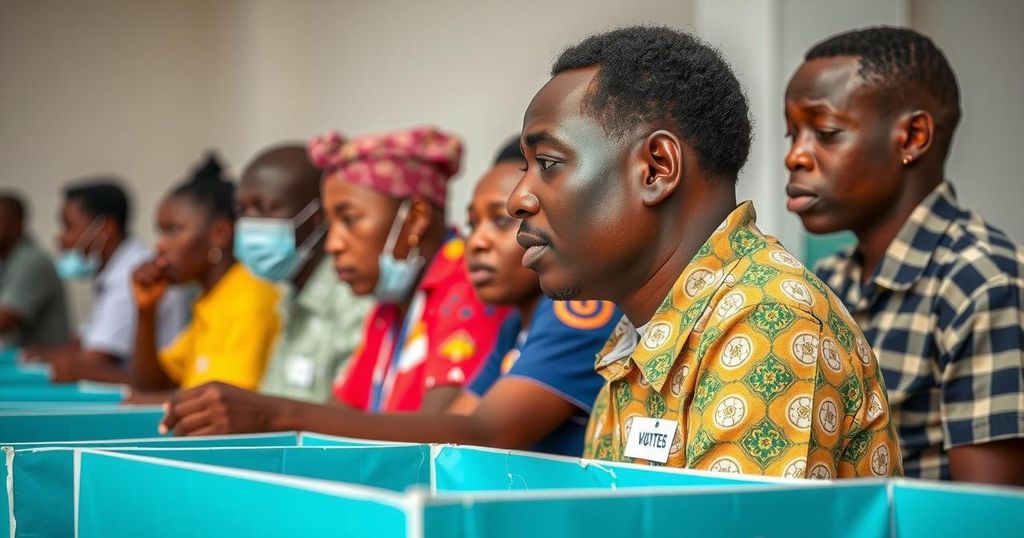World news
2024 ELECTIONS, AFRICA, ALI BONGO ONDIMBA, BILLBOARD, BR, BRICE OLIGUI NGUEMA, COMMITTEE FOR THE TRANSITION AND RESTORATION OF INSTITUTIONS, CORRUPTION, CT, ELECTIONS, GABON, INTERIOR MINISTRY, LIBREVILLE, NATIONAL ASSEMBLY, OLIGUI, POLITICS, UNION NEWSPAPER, VOTER TURNOUT
Michael Grant
0 Comments
Gabon’s Proposed Constitution Receives Overwhelming Support in Referendum
Gabon’s military rulers announced that a new constitution has reportedly received 91.8 percent approval in a recent referendum, aiming to limit presidential terms and ensuring authentic Gabonese representation. Criticism surrounds the potential for authoritarianism and power consolidation within the military leadership following President Bongo’s ousting last year. Voter turnout stood at 53.54 percent, amid public concerns over governance and unemployment.
Gabon’s military rulers have reported that a new constitution has received widespread approval in a recent referendum, with provisional results indicating that 91.8 percent of voters backed the proposal. The constitution aims to establish a presidency limited to two seven-year terms without a prime minister, thus aiming for political stability within the oil-rich nation. Registered voters were urged to participate actively in the referendum, with an estimated turnout of 53.54 percent. The transitional president, Brice Oligui Nguema, conducting his vote, hailed the referendum as a significant progress for Gabon.
The new constitutional framework stipulates that only candidates with Gabonese citizenship, having at least one Gabon-born parent and a Gabonese spouse, may run for presidency. This condition disqualifies the former ruler, Ali Bongo Ondimba, who was ousted following a coup last year, and has led to concerns that the proposed regulations serve to consolidate power within the current military leadership. Critics have expressed their apprehensions regarding the potential emergence of authoritarian governance under the new constitution.
Despite the officials assuring transparency in the electoral process, skepticism remains concerning the integrity of the administration’s claims. Gabon has witnessed significant turbulence following the allegations of corruption under Bongo and widespread calls for governmental accountability. Unemployment and economic concerns top the agenda for many citizens, highlighting the urgent need for genuine governance improvements alongside the new constitutional changes. Should the final results confirm the provisional findings, it remains critical for the transitional government to ensure that the path to democracy is not compromised by the concentration of power.
Gabon, an oil-rich country in Central Africa, has recently experienced political upheaval following a military coup that resulted in the ousting of long-serving President Ali Bongo Ondimba. The coup leaders, known as the Committee for the Transition and Restoration of Institutions (CTRI), have aimed to implement a new constitution to secure political stability and promote national unity. This initiative comes in a context marked by allegations of corruption and governance failures under the Bongo administration. The proposed constitutional reforms are seen by some as a step towards democratization, while others are concerned about potential authoritarianism and the entrenchment of military rule.
In summary, Gabon’s recent referendum results reflect a strong approval for the newly proposed constitution amidst a backdrop of political transition. The constitution seeks to redefine presidential terms and eligibility while addressing past governance challenges. However, the concerns raised regarding the potential for dictatorial governance warrant continued scrutiny as Gabon navigates its political future. The final determination from the constitutional court will ultimately reveal whether this new chapter in Gabon’s governance will foster true democratic values or reinforce military dominance.
Original Source: www.tiogapublishing.com




Post Comment